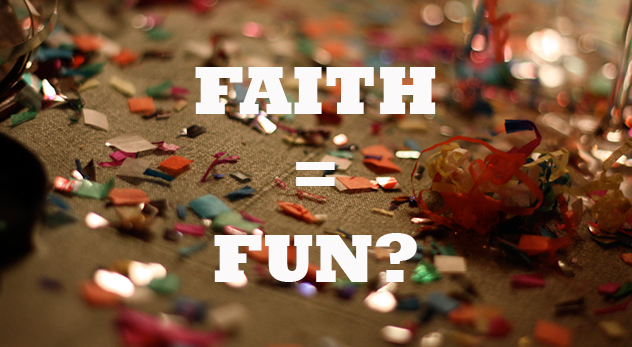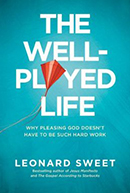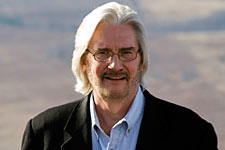
A prominent Christian author and professor says Christians need to stop making Christianity a “worker harder” religion. – Image courtesy of Andreas Graulund (http://bit.ly/1psC5mD)
Pleasing God doesn’t have to be such hard work. It should be fun.
This is the message that Leonard Sweet, Christian author and professor, puts forth in his new book, “The Well-Played Life.” He argues that the faithful should unclench our teeth, loosen our grips, and actually experience God’s pleasure in us. Here, we discuss the arguments he’s making and how he believes we can make faith fun.
RNS: You describe the ways Christians try to work harder to please God. Is this the same challenge the Pharisees faced?
LS: The church today says the same thing the Pharisees did: “Come unto me, all who labor and are heavy laden, and I will give you . .. . more work.” Actually, these are Jesus’ words, but he promised tranquility, not toil. To become a disciple of Jesus in today’s church is almost to be sentenced to hard labor, so far are we removed from the Hebrew understanding of life as Shabbat Shalom. It’s time to trade in our hard hats or pin stripes for a pinata … with some confetti thrown in.
In the earliest creation story, the first time we meet God, God is down and dirty–playing in the dirt, making mud pies, getting God’s hands dirty and wet, fashioning us in the divine image for the sheer pleasure of our company. Creation is not God at work, but God at play. Labor enters the story with the fall, and we prefer work to play because there is an out-of-control and surprise element to play.
We need to learn to play at life again. All beauty, artistry, excellence comes out of a play paradigm, not a work paradigm. When you work at something, whether it be life or relationships, sports or art, you’re forcing something to be rigid and mechanical that should be natural and pleasurable. We make it harder than it needs to be. Being the church doesn’t require us to earn God’s favor through deeds and acts. All we need to do is worship God in joy and pleasure. This is our nature. This is who we were meant to be.
RNS: But, at the same time, doesn’t James say “faith without works is dead”? So there is a works component to faith isn’t there?
LS: Play requires practice, and lots of it. But there is a whole different spirit to the joy of “practicing” together something you play out rather than “working” at something you are forced to do to achieve a goal. The church is a community of practice. But practice erupts from the joy of loving relationships. We don’t earn love by our actions. Works flow from faith naturally in joy and passion. They issue as the fruit of incarnation.
When you’re forced to work at the piano you never want to do it, and it becomes an annoyance in your life. When you discover the joy of playing the piano, your practice becomes your passion and you never want to stop.
RNS: Is “play” what Jesus was hinting at when he urged us to have faith like a child?
LS: Jesus was criticized for many things: one of which was that he enjoyed life a little too much. On top of that, Jesus was attacked because he spent too much time hanging with the wrong people, and didn’t keep children at arms’ length. On top of that, this wifeless childless male was the biggest patron and defender of children. In fact, some of Jesus’ biggest anger episodes in the gospels are triggered by mis-treatment of children.
Jesus’ own words were “Let the little children come to me, for of such is the kingdom of heaven.” Or in an updated translation, “There will be no grownups in heaven.” For Jesus, childhood is not something you grow out of, but grow into. Why? Because children are spontaneous, curious, open to the new, trusting, and can play with anyone at any moment. And they find joy in every moment of life. [tweetable]The way of a disciple is not childishness, but childlikeness.[/tweetable]
RNS: How does the experience of play, and enjoying God’s pleasure, intersect with your own life? Did this book spring from your own experience?
LS: I love to begin every day with an aroma cocktail, and make every shower an aroma boutique. Is that what you’re after?
Seriously, this book is in some ways a mea culpa . . . an “I had it wrong” apology for workaholism. I’m learning some Italian to slow me down, and found this lilting Italian phrase “dolce far niente” meaning “pleasantly doing nothing,” which I’m trying to practice in my own life.
RNS: For most people faith is serious business. What do you think, practically, we can do to make faith more fun?
LS: You’re right. We are more followers of the Pharisees than Jesus the Christ. We have become solemn, austere, intense, laborious, lugubrious, boring. It’s time to lighten up. For a church founded on a pun (Jesus is punning on the words “Petras” and “Petra”) to have trouble with laughter and humor is bad form.
For one thing, we need to laugh more. I was listening to a podcast on the baptism of Jesus and the tag line for the show was, “Less laughter, More Jesus.” Is that what the world needs? Less laughing Christians? In fact, Jesus had a rich laugh life, and was constantly smiling, laughing, telling funny stories, joking with his disciples. So the truth is “More laughter, More Jesus.”







